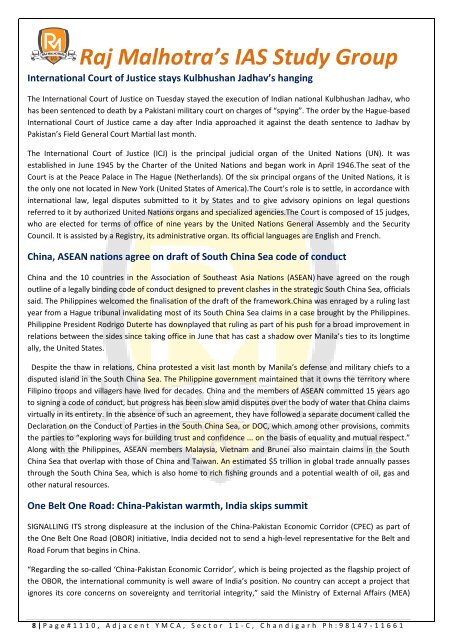Hard Facts 05 2017 (May)
Create successful ePaper yourself
Turn your PDF publications into a flip-book with our unique Google optimized e-Paper software.
Raj Malhotra’s IAS Study Group<br />
International Court of Justice stays Kulbhushan Jadhav’s hanging<br />
The International Court of Justice on Tuesday stayed the execution of Indian national Kulbhushan Jadhav, who<br />
has been sentenced to death by a Pakistani military court on charges of “spying”. The order by the Hague-based<br />
International Court of Justice came a day after India approached it against the death sentence to Jadhav by<br />
Pakistan’s Field General Court Martial last month.<br />
The International Court of Justice (ICJ) is the principal judicial organ of the United Nations (UN). It was<br />
established in June 1945 by the Charter of the United Nations and began work in April 1946.The seat of the<br />
Court is at the Peace Palace in The Hague (Netherlands). Of the six principal organs of the United Nations, it is<br />
the only one not located in New York (United States of America).The Court’s role is to settle, in accordance with<br />
international law, legal disputes submitted to it by States and to give advisory opinions on legal questions<br />
referred to it by authorized United Nations organs and specialized agencies.The Court is composed of 15 judges,<br />
who are elected for terms of office of nine years by the United Nations General Assembly and the Security<br />
Council. It is assisted by a Registry, its administrative organ. Its official languages are English and French.<br />
China, ASEAN nations agree on draft of South China Sea code of conduct<br />
China and the 10 countries in the Association of Southeast Asia Nations (ASEAN) have agreed on the rough<br />
outline of a legally binding code of conduct designed to prevent clashes in the strategic South China Sea, officials<br />
said. The Philippines welcomed the finalisation of the draft of the framework.China was enraged by a ruling last<br />
year from a Hague tribunal invalidating most of its South China Sea claims in a case brought by the Philippines.<br />
Philippine President Rodrigo Duterte has downplayed that ruling as part of his push for a broad improvement in<br />
relations between the sides since taking office in June that has cast a shadow over Manila’s ties to its longtime<br />
ally, the United States.<br />
Despite the thaw in relations, China protested a visit last month by Manila’s defense and military chiefs to a<br />
disputed island in the South China Sea. The Philippine government maintained that it owns the territory where<br />
Filipino troops and villagers have lived for decades. China and the members of ASEAN committed 15 years ago<br />
to signing a code of conduct, but progress has been slow amid disputes over the body of water that China claims<br />
virtually in its entirety. In the absence of such an agreement, they have followed a separate document called the<br />
Declaration on the Conduct of Parties in the South China Sea, or DOC, which among other provisions, commits<br />
the parties to “exploring ways for building trust and confidence ... on the basis of equality and mutual respect.”<br />
Along with the Philippines, ASEAN members Malaysia, Vietnam and Brunei also maintain claims in the South<br />
China Sea that overlap with those of China and Taiwan. An estimated $5 trillion in global trade annually passes<br />
through the South China Sea, which is also home to rich fishing grounds and a potential wealth of oil, gas and<br />
other natural resources.<br />
One Belt One Road: China-Pakistan warmth, India skips summit<br />
SIGNALLING ITS strong displeasure at the inclusion of the China-Pakistan Economic Corridor (CPEC) as part of<br />
the One Belt One Road (OBOR) initiative, India decided not to send a high-level representative for the Belt and<br />
Road Forum that begins in China.<br />
“Regarding the so-called ‘China-Pakistan Economic Corridor’, which is being projected as the flagship project of<br />
the OBOR, the international community is well aware of India’s position. No country can accept a project that<br />
ignores its core concerns on sovereignty and territorial integrity,” said the Ministry of External Affairs (MEA)<br />
8 | P a g e # 1 1 1 0 , A d j a c e n t Y M C A , S e c t o r 1 1 - C , C h a n d i g a r h P h : 9 8 1 4 7 - 1 1 6 6 1





